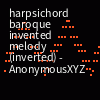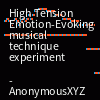AnonymousXYZ
Online 2025 days ago
Member since 2018-09-04
0 sequences
0 playlists
22,219 plays
Online 2025 days ago
Member since 2018-09-04
0 sequences
0 playlists
22,219 plays
Here I will describe the elements (emotions) that I perceive in the music that I composed
 - One version of ideality of separatating when a melody ends, and when another begins
- One version of ideality of separatating when a melody ends, and when another begins
 - Self explanatory title
- Self explanatory title
 - Happy ending
- Happy ending
 - baroque sounding melodic sequence using only sequentially triple-note indivual melodies
- baroque sounding melodic sequence using only sequentially triple-note indivual melodies
 - Self explanatory title
- Self explanatory title
 - Self explanatory title
- Self explanatory title
 - One form of expressing the feel of vigorous lamentation
- One form of expressing the feel of vigorous lamentation
 - untitled1 - Fragile, weak, sad: of a child. Ending with hardness
- untitled1 - Fragile, weak, sad: of a child. Ending with hardness
 - untitled2 - Fragile, weak, sad: of a child with a longing. Ending with a succumbness to hardness.
- untitled2 - Fragile, weak, sad: of a child with a longing. Ending with a succumbness to hardness.
 - untitled3 - Bland exercise
- untitled3 - Bland exercise
 - untitled4 - Interesting theory; bland exercise
- untitled4 - Interesting theory; bland exercise
 - untitled5 - A secret
- untitled5 - A secret
 - untitled6 - Fragile, weak, sad: of a child with a longing and quickness and desperation and coldness. Ending with a succumbness to hardness and darkness.
- untitled6 - Fragile, weak, sad: of a child with a longing and quickness and desperation and coldness. Ending with a succumbness to hardness and darkness.
 - untitled6 v2 (12 keys) - (Same as untitled6). The repetitions in other keys are for strength and power, but it is overwhelming. It is bland and boring if repeated continuously so without adequate change and extra content.
- untitled6 v2 (12 keys) - (Same as untitled6). The repetitions in other keys are for strength and power, but it is overwhelming. It is bland and boring if repeated continuously so without adequate change and extra content.
 - untitled7 - Baroque-type method of putting 2 melodies together
- untitled7 - Baroque-type method of putting 2 melodies together
 - untitled8 - One form of expressing lamentation
- untitled8 - One form of expressing lamentation
 - untitled9 - One form of a fantasy of romance of a woman; with longing
- untitled9 - One form of a fantasy of romance of a woman; with longing
 - untitled10 - Putting any kind of tune against a descending and ascending scale (minor)
- untitled10 - Putting any kind of tune against a descending and ascending scale (minor)
 - untitled11 - Putting form and order to convoluted melodies
- untitled11 - Putting form and order to convoluted melodies
 - untitled12 - Sorrow, with longing in a fantasy. With a happy ending
- untitled12 - Sorrow, with longing in a fantasy. With a happy ending
 - untitled13 - Lament, with longing; in attack formation; leading to an ending of fantasy of happiness
- untitled13 - Lament, with longing; in attack formation; leading to an ending of fantasy of happiness
 - untitled14 - Sombre exercise
- untitled14 - Sombre exercise
 - untitled15 - The overwhelming power of this form of expression of doom
- untitled15 - The overwhelming power of this form of expression of doom
 - untitled16 - A secret
- untitled16 - A secret
 - untitled17 - A secret
- untitled17 - A secret
 - untitled18 - Fragile, weak, happy: of a child. Ending with Happiness
- untitled18 - Fragile, weak, happy: of a child. Ending with Happiness
 - untitled19 - A secret
- untitled19 - A secret
 - untitled19(tracks-separated) - A secret. Analyse this sequnece and my others to determine the qualities of it and untitled19
- untitled19(tracks-separated) - A secret. Analyse this sequnece and my others to determine the qualities of it and untitled19
This is a fraction of the desciption of how I perceive music. It is adequate.
I hope I didn't make a mistake of the pasting of the url's.
I like to try to express different and contrasting musical ideas when I compose separate compositions.
These ideas are generally perceived as emotions that are evoked in music (eg, happiness, sadness, something gentle or beautiful, darkness, longing, etc.)
I like to explore the different emotions that can be expressed through music; generally, people just talk about whether it sounds good, or has a good beat, or they just talk about the complexity or simplicity of the melody (or stuff like that).
So, based on the previous sentence, I am uniquely different (in the minority) on my views about music, so If I talk about it to people in general, they aren't really interested in my view of the music, because they can't really perceive it as I do.
So, that is why I am trying to compose music that evokes particular emotions and feelings, so that I can get better at putting them into proper tangible musical forms that are accepted by the general public as 'correct-sounding' classical or baroque music.
Once I have a better grasp of how to evoke particular emotions and feelings in music, and, once I know how to manipulate them together in relation to each other to achieve particular effects and responses and 'ends' and 'points' (eg. meaning, when someone says "the point of doing this thing is to..."), then I will put them to use in forming them in the shape and form and sound of proper classical and baroque music so that it shall be agreeable and acceptable to the common ear of the common person.
But right now, my music is harsh, sever, bleak, grim, strident, cacophonous and bereft of the pleasantness that is found in classical and baroque music; this is so because of the rawness of the melodies that I composed; but it is helpful for the purpose of analysis and scrutiny to achieve an understanding of the particulars of emotion and feelings of music; and it is helpful for the purpose of analysis and scrutiny to achieve advancement in the skill of composing classical and baroque music that expresses emotions and feelings properly and fully.
Thus is the purpose of my compositions, and, why I compose them, and, what I aim and strive and want and intend to achieve.
The music of the main them song of 'the phantom of the opera', is an example of powerful emotions and feelings that are expressed and exuded by music and context; these emotions and feelings are in a simple musical form, yet they are powerful.
https://www.youtube.com/watch?v=-JaeBxYCI9k
This is who I am.
The purpose of my few newest compositions is an exploration of atonal music. I am trying to make a properly sounding melody that is atonal; though this is exceedingly difficult. The ending of untitled23 is a testament of a properly sounding melody that is atonal, which means that such a thing is possible.
This is a fraction of the desciption of how I perceive music. It is adequate.
I hope I didn't make a mistake of the pasting of the url's.
I like to try to express different and contrasting musical ideas when I compose separate compositions.
These ideas are generally perceived as emotions that are evoked in music (eg, happiness, sadness, something gentle or beautiful, darkness, longing, etc.)
I like to explore the different emotions that can be expressed through music; generally, people just talk about whether it sounds good, or has a good beat, or they just talk about the complexity or simplicity of the melody (or stuff like that).
So, based on the previous sentence, I am uniquely different (in the minority) on my views about music, so If I talk about it to people in general, they aren't really interested in my view of the music, because they can't really perceive it as I do.
So, that is why I am trying to compose music that evokes particular emotions and feelings, so that I can get better at putting them into proper tangible musical forms that are accepted by the general public as 'correct-sounding' classical or baroque music.
Once I have a better grasp of how to evoke particular emotions and feelings in music, and, once I know how to manipulate them together in relation to each other to achieve particular effects and responses and 'ends' and 'points' (eg. meaning, when someone says "the point of doing this thing is to..."), then I will put them to use in forming them in the shape and form and sound of proper classical and baroque music so that it shall be agreeable and acceptable to the common ear of the common person.
But right now, my music is harsh, sever, bleak, grim, strident, cacophonous and bereft of the pleasantness that is found in classical and baroque music; this is so because of the rawness of the melodies that I composed; but it is helpful for the purpose of analysis and scrutiny to achieve an understanding of the particulars of emotion and feelings of music; and it is helpful for the purpose of analysis and scrutiny to achieve advancement in the skill of composing classical and baroque music that expresses emotions and feelings properly and fully.
Thus is the purpose of my compositions, and, why I compose them, and, what I aim and strive and want and intend to achieve.
The music of the main them song of 'the phantom of the opera', is an example of powerful emotions and feelings that are expressed and exuded by music and context; these emotions and feelings are in a simple musical form, yet they are powerful.
https://www.youtube.com/watch?v=-JaeBxYCI9k
This is who I am.
The purpose of my few newest compositions is an exploration of atonal music. I am trying to make a properly sounding melody that is atonal; though this is exceedingly difficult. The ending of untitled23 is a testament of a properly sounding melody that is atonal, which means that such a thing is possible.